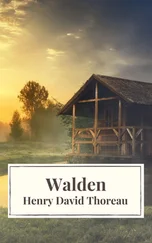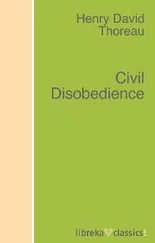Unfitted to some extent for the purposes of commerce by the sand-bar at its mouth, see how this river was devoted from the first to the service of manufactures. Issuing from the iron region of Franconia, and flowing through still uncut forests, by inexhaustible ledges of granite, with Squam, and Winnipiseogee, and Newfound, and Massabesic Lakes for its mill-ponds, it falls over a succession of natural dams, where it has been offering its privileges in vain for ages, until at last the Yankee race came to improve them. Standing at its mouth, look up its sparkling stream to its source,—a silver cascade which falls all the way from the White Mountains to the sea,—and behold a city on each successive plateau, a busy colony of human beaver around every fall. Not to mention Newburyport and Haverhill, see Lawrence, and Lowell, and Nashua, and Manchester, and Concord, gleaming one above the other. When at length it has escaped from under the last of the factories, it has a level and unmolested passage to the sea, a mere waste water , as it were, bearing little with it but its fame; its pleasant course revealed by the morning fog which hangs over it, and the sails of the few small vessels which transact the commerce of Haverhill and Newburyport. But its real vessels are railroad cars, and its true and main stream, flowing by an iron channel farther south, may be traced by a long line of vapor amid the hills, which no morning wind ever disperses, to where it empties into the sea at Boston. This side is the louder murmur now. Instead of the scream of a fish-hawk scaring the fishes, is heard the whistle of the steam-engine, arousing a country to its progress.
This river too was at length discovered by the white man, "trending up into the land," he knew not how far, possibly an inlet to the South Sea. Its valley, as far as the Winnipiseogee, was first surveyed in 1652. The first settlers of Massachusetts supposed that the Connecticut, in one part of its course, ran northwest, "so near the great lake as the Indians do pass their canoes into it over land." From which lake and the "hideous swamps" about it, as they supposed, came all the beaver that was traded between Virginia and Canada,—and the Potomac was thought to come out of or from very near it. Afterward the Connecticut came so near the course of the Merrimack that, with a little pains, they expected to divert the current of the trade into the latter river, and its profits from their Dutch neighbors into their own pockets.
Unlike the Concord, the Merrimack is not a dead but a living stream, though it has less life within its waters and on its banks. It has a swift current, and, in this part of its course, a clayey bottom, almost no weeds, and comparatively few fishes. We looked down into its yellow water with the more curiosity, who were accustomed to the Nile-like blackness of the former river. Shad and alewives are taken here in their season, but salmon, though at one time more numerous than shad, are now more rare. Bass, also, are taken occasionally; but locks and dams have proved more or less destructive to the fisheries. The shad make their appearance early in May, at the same time with the blossoms of the pyrus, one of the most conspicuous early flowers, which is for this reason called the shad-blossom. An insect called the shad-fly also appears at the same time, covering the houses and fences. We are told that "their greatest run is when the apple-trees are in full blossom. The old shad return in August; the young, three or four inches long, in September. These are very fond of flies." A rather picturesque and luxurious mode of fishing was formerly practised on the Connecticut, at Bellows Falls, where a large rock divides the stream. "On the steep sides of the island rock," says Belknap, "hang several arm-chairs, fastened to ladders, and secured by a counterpoise, in which fishermen sit to catch salmon and shad with dipping nets." The remains of Indian weirs, made of large stones, are still to be seen in the Winnipiseogee, one of the head-waters of this river.
It cannot but affect our philosophy favorably to be reminded of these shoals of migratory fishes, of salmon, shad, alewives, marsh-bankers, and others, which penetrate up the innumerable rivers of our coast in the spring, even to the interior lakes, their scales gleaming in the sun; and again, of the fry which in still greater numbers wend their way downward to the sea. "And is it not pretty sport," wrote Captain John Smith, who was on this coast as early as 1614, "to pull up twopence, sixpence, and twelvepence, as fast as you can haul and veer a line?"—"And what sport doth yield a more pleasing content, and less hurt or charge, than angling with a hook, and crossing the sweet air from isle to isle, over the silent streams of a calm sea."
On the sandy shore, opposite the Glass-house village in Chelmsford, at the Great Bend where we landed to rest us and gather a few wild plums, we discovered the Campanula rotundifolia , a new flower to us, the harebell of the poets, which is common to both hemispheres, growing close to the water. Here, in the shady branches of an apple-tree on the sand, we took our nooning, where there was not a zephyr to disturb the repose of this glorious Sabbath day, and we reflected serenely on the long past and successful labors of Latona.
"So silent is the cessile air,
That every cry and call,
The hills, and dales, and forest fair
Again repeats them all.
"The herds beneath some leafy trees,
Amidst the flowers they lie,
The stable ships upon the seas
Tend up their sails to dry."
As we thus rested in the shade, or rowed leisurely along, we had recourse, from time to time, to the Gazetteer, which was our Navigator, and from its bald natural facts extracted the pleasure of poetry. Beaver River comes in a little lower down, draining the meadows of Pelham, Windham, and Londonderry. The Scotch-Irish settlers of the latter town, according to this authority, were the first to introduce the potato into New England, as well as the manufacture of linen cloth.
Everything that is printed and bound in a book contains some echo at least of the best that is in literature. Indeed, the best books have a use, like sticks and stones, which is above or beside their design, not anticipated in the preface, nor concluded in the appendix. Even Virgil's poetry serves a very different use to me to-day from what it did to his contemporaries. It has often an acquired and accidental value merely, proving that man is still man in the world. It is pleasant to meet with such still lines as,
"Jam laeto turgent in palmite gemmae";
Now the buds swell on the joyful stem.
"Strata jacent passim sua quaeque sub arbore poma";
The apples lie scattered everywhere, each under its tree.
In an ancient and dead language, any recognition of living nature attracts us. These are such sentences as were written while grass grew and water ran. It is no small recommendation when a book will stand the test of mere unobstructed sunshine and daylight.
What would we not give for some great poem to read now, which would be in harmony with the scenery,—for if men read aright, methinks they would never read anything but poems. No history nor philosophy can supply their place.
The wisest definition of poetry the poet will instantly prove false by setting aside its requisitions. We can, therefore, publish only our advertisement of it.
There is no doubt that the loftiest written wisdom is either rhymed, or in some way musically measured,—is, in form as well as substance, poetry; and a volume which should contain the condensed wisdom of mankind need not have one rhythmless line.
Yet poetry, though the last and finest result, is a natural fruit. As naturally as the oak bears an acorn, and the vine a gourd, man bears a poem, either spoken or done. It is the chief and most memorable success, for history is but a prose narrative of poetic deeds. What else have the Hindoos, the Persians, the Babylonians, the Egyptians done, that can be told? It is the simplest relation of phenomena, and describes the commonest sensations with more truth than science does, and the latter at a distance slowly mimics its style and methods. The poet sings how the blood flows in his veins. He performs his functions, and is so well that he needs such stimulus to sing only as plants to put forth leaves and blossoms. He would strive in vain to modulate the remote and transient music which he sometimes hears, since his song is a vital function like breathing, and an integral result like weight. It is not the overflowing of life but its subsidence rather, and is drawn from under the feet of the poet. It is enough if Homer but say the sun sets. He is as serene as nature, and we can hardly detect the enthusiasm of the bard. It is as if nature spoke. He presents to us the simplest pictures of human life, so the child itself can understand them, and the man must not think twice to appreciate his naturalness. Each reader discovers for himself that, with respect to the simpler features of nature, succeeding poets have done little else than copy his similes. His more memorable passages are as naturally bright as gleams of sunshine in misty weather. Nature furnishes him not only with words, but with stereotyped lines and sentences from her mint.
Читать дальше












